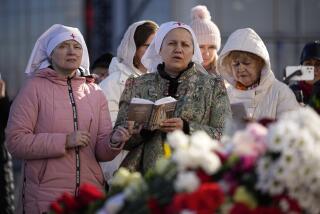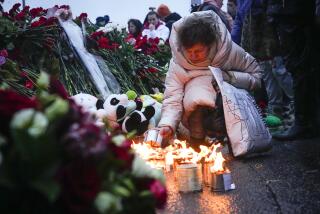Moscow police arrest anti-Kremlin activists
- Share via
MOSCOW — For beleaguered but feisty anti-Kremlin activists of various political stripes, Saturday was a day of drama and high tension, as young radicals and fed-up pensioners alike used a protest march and rally to taunt authorities.
The demonstrators succeeded in provoking the government to bare its teeth, with police officers arresting hundreds and trying to intimidate journalists.
The day was not without humor, however. After police detained one of the protest organizers, Garry Kasparov, a former world chess champion turned democratic activist, a rally speaker declared wryly that Kasparov was “playing chess” with the authorities.
Kasparov and his disparate allies, including a former prime minister and a writer who heads a radical youth group, share the goal of keeping protest alive in a country where Russian President Vladimir V. Putin’s government asserts ever-greater centralized control.
Putin enjoys more than 70% support ratings, and many critics question why, given that popularity, his government appears intent on stifling even weak opposition.
At most, 3,000 people made an attempt to protest Saturday in Moscow, but authorities called out 9,000 officers to maintain control.
Some opposition activists argue that the response was proof that Putin’s circle is neither as powerful nor as monolithic as it seems.
In recent months, Kasparov and his associates, along with London-based tycoon Boris Berezovsky, a onetime political insider turned fierce Putin critic, have outlined similar visions of how greater democracy might come to Russia. Under their scenario, street protests would keep the spark of dissent alive, and at some point the Kremlin power structure would split, with one faction going over to the opposition. True political competition and greater hope for real democracy could then take hold, they say.
Although critics in Moscow and those outside Russia appear to be working in parallel, Kasparov’s group has distanced itself from Berezovsky, who has implied that he is giving financial support to secret opponents of Putin within the Kremlin inner circle.
‘Dissenters’ March’
Kasparov’s group, Other Russia, had announced plans to hold a “Dissenters’ March” and rally Saturday centered on Pushkin Square, the Russian capital’s premier spot for such events. But they were denied permission after a pro-Kremlin youth group was given a rally permit for the same time and place.
City authorities offered Other Russia use of a park in the Chistye Prudy area for their rally but said no march would be allowed because of the disruption it would cause.
Other Russia accepted the approved rally site but told supporters to gather informally near Pushkin Square and then walk the roughly one-mile distance to Chistye Prudy.
The pro-Kremlin youth group, which had said that it obtained the permit in order to deny Pushkin Square to Other Russia, did not hold an event there, and by late morning the square was simply cordoned off by police.
Thus was Saturday’s chessboard set.
Kasparov and some other activists were detained near Pushkin Square soon after their arrival and were placed on a police bus. As he was being driven off, Kasparov managed to shout out an open window, “This regime is criminal. This is a police state. They arrest people everywhere.”
His lawyer later said Kasparov had been charged with “shouting anti-government slogans in the presence of a large group of people,” the Russian news agency Interfax reported.
He was released late in the evening after being fined $39 for violation of public order.
Around the same time that Kasparov was arrested, other protesters began approaching the police officers who had cordoned off Pushkin Square.
“Why are you not allowing people to get together and hold rallies as the constitution provides?” one man, who later identified himself as Yevgeny Shimenkov, 67, said to an officer.
“The constitution is for you. For us, there are orders of our commander,” the policeman replied.
“You must know your orders are criminal. Your commander is a criminal and you are his accomplices,” Shimenkov said.
“Get out of here, old man, before I arrest you,” the policeman retorted.
Riot police move
After about 30 minutes, police began to press protesters farther away from the square; and suddenly many people who had gathered in the area, some appearing to be simply bystanders, began walking toward the park at Chistye Prudy. Soon, a column of nearly 1,000 people was snaking along the sidewalk and spilling into the street, in effect conducting the unauthorized Dissenters’ March.
Some youthful members of the National Bolshevik Party, a banned radical youth group that specializes in theatrical anti-Kremlin protests, unfurled their hammer-and-sickle flag and lighted flares. The group is headed by Eduard Limonov, a writer criticized by some for having a nondemocratic ideology. Kasparov and former Prime Minister Mikhail M. Kasyanov have said that their alliance with him is justified by a need to unite all anti-Kremlin forces to keep hope for democracy alive.
When the crowd had walked about half a mile, hundreds of riot police officers moved in, mostly going after young people and those with flags or banners, grabbing them roughly and putting them on police buses. People with cameras were also targets, although most journalists who could produce accreditation cards were released on the spot. Some middle-aged and elderly protesters also were detained.
Reuters news agency reported that four of its journalists -- two photographers and two camera crew members-- were detained as they covered the protest. They were later released without being charged, it said.
Police said they detained about 250 demonstrators, the Russian news agency RIA Novosti reported.
About 1,000 protesters eventually gathered at the approved site to hear speeches, including one by Kasyanov, who served during Putin’s first presidential term but joined the opposition after being dismissed from office three years ago.
“There are no free elections. There is no respect for people,” said Kasyanov, a potential opposition presidential candidate in balloting next year, when the constitution requires that Putin step down.
“The authorities are afraid of free people. They’re not afraid of slaves and obedient people. But they’re afraid of you.”
Times staff writer Sergei L. Loiko contributed to this report.
More to Read
Sign up for Essential California
The most important California stories and recommendations in your inbox every morning.
You may occasionally receive promotional content from the Los Angeles Times.












